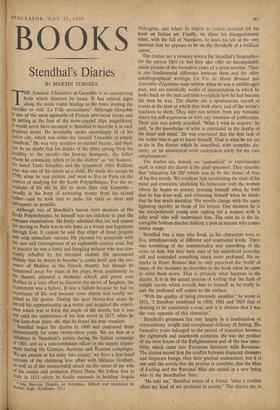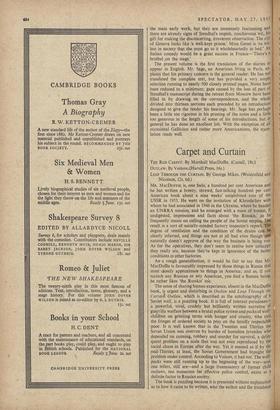BOOKS
Stendhal's Diaries
By MARTIN TURNELL THE Syndicat d'Mitiative at Grenoble is an enterprising body which deserves its name. It has erected signs along the main routes leading to the town inviting the traveller to visit 'La Ville accueillante.' Although Grenoble is one of the most agreeable of French provincial towns and its setting at the foot of the snow-capped Alps magnificent, it would never have occurred to Stendhal to describe it in such gracious terms. He invariably spoke exceedingly ill of his native city, which was either the 'insipid' Grenoble or simply `nuidhole.' He was very sensitive to natural beauty, and there can be no doubt that his dislike of the place sprang from his hostility to the people—the frowsty bourgeois, the father whom he constantly refers to in the diaries* as `my bastard,' the hated Tante Seraphic, and the tyrannical Abbe Raillane who was one of his tutors as a child. He made his escape in 1799, when he was sixteen, and went to live in Paris on the Pretext of studying for the Ecole Polytechnique. For the re- mainder of his life he did no more than visit Grenoble— usually in the hope of extracting money from his ruined father—and he took care to make his visits as short and infrequent as possible. Pietragrua, and where he begins to collect material for his book on Italian art. Finally, we share his disappointment when, with the fall of Napoleon, he loses his job at the very moment that he appears to be on the threshold of a' brilliant career. • The diaries arc a primary source for Stendhal's biographers for the period 1801-14, but they also offer an incomparable inside picture of the formative years of a great novelist. There is one fundamental difference between them and the other autobiographical writings. La Vie de Henri Brulard and Souvenirs d'egotisme were written when he was a middle-aged man, and are essentially works of interpretation in which he looks back on the past and tries to explain low he had become the man he was. The diaries are a spontaneous record of events at the time at which they took place, and of the writer's reactions to them. They were not written from any romantic desire for self-expression or with any intention of publication. Their aim was purely practical. 'What I wish to acquire,' he said, 'is the knowledge of what is concealed in the depths of the heart and mind.' He was convinced that the first task of the writer was to get to know himself. That is what he set out to do in the diaries which he described, with complete sin- cerity, as 'an anatomical work undertaken solely for my own enlightenment.'
The diatics are, indeed, an 'anatomical' or experimental work in which the diarist is the chief specimen. They describe, that 'education for life' which was to be the theme of four of his five novels. We overhear him scrutinising the state of his mind and emotions, analysing his behaviour with the women whom he hopes to seduce, praising himself when he feels that he has done well, and criticising himself when he thinks that he has made mistakes. His moods change with the same lightning rapidity as those of his heroes. One moment he is the inexperienced young man sighing for a woman with 'a lofty soul' who will understand him. The next he is the in- corrigible bottom-pincher making a pass at anyone who comes within range. the main early work, but they are immensely fascinating and there are already sign$ of Stendhal's impish, mischievous wit, his gift for making the disconcerting, irreverent observation. The city of Geneva looks like 'a well-kept prison.' Mme Genet is `so wit- less in society that she must go to it wholeheartedly in bed.' An Italian comedy would be a great success in France—`There's a brothel ,on the stage.' The present volume is the first translation of the- diaries to appear in English. Mi. Sage, an American living in Paris, ex- plains that his primary concern is the general reader. He has not translated the complete text, but has provided a very ample, selection running to nearly 500 closely printed' pages. Notes have been reduced to a minimum; gaps caused by the loss of, part of Stendhal's manuscript during, the retreat from Moscow have been filled in by drawing on the correspondence, and the whole divided into thirteen sections each preceded by an introduction designed to give the teader his bearings. Mr. Sage has perhaps been a little too rigorous in his pruning of the. notes and a little too generous in the length of some of his introductions, but in general he has done an excellent job. With the exception of an occasional Gallicism and rather more Americanisms, the trans- lation reads well.



































 Previous page
Previous page